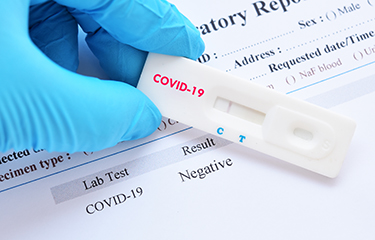Salmon farming companies in Chile are making an effort to do their part in helping the country respond to the COVID-19 pandemic – yet new reports provide evidence to the fact that there is definite room for improvement.
In its latest press release, AquaChile announced it had begun to perform up to 2,000 COVID-19 tests a week, free of charge, for the island of Chiloé, where much of Chile’s salmon farming takes place.
“This is a collaborative endeavor which shows all of us – in the health department as a public entity and with the support of private companies – are making every effort to overcome the coronavirus pandemic,” Chiloé Health Department Director Erik Poblete said. "Having a laboratory that will carry out testing exclusively for Chiloé is very positive for our area and allows us to better face this pandemic."
The first tests were performed over the weekend (18 to 19 April) at AquaChile’s laboratory located in Puerto Montt, in the Los Lagos Region. The company said it is covering the costs of the laboratory’s professionals and technicians, supplies, and research teams to perform the entire process of testing once the samples are received from health professionals. The number of tests performed could increase if necessary, AquaChile added.
In accordance with the standards outlined in the World Health Organization’s (WHO) Biosecurity Manual, the AquaChile laboratory has NCh ISO 17025 accreditation with Level 2 biosecurity, which makes it apt to perform the exams.
The announcement follows news published at the end of March by Chile’s Health Ministry (Minsal) of the opening of the first laboratory for coronavirus detection in Puerto Aysén, in the Aysén Region, due south of Los Lagos and bordering Chile’s Antarctic Region. The public-private collaboration between the Aysén Health Department, San Sebastián University, AquaChile, and the Center for Applied Biological Research (CIBA) enabled coronavirus testing within the region – tests previously needed to be sent outside the region for processing, with the loss of valuable time. Under the partnership, the PCR technique is employed for COVID-19 diagnosis, reducing waiting times from five days to five hours.
However, despite the positive actions, fishing companies’ relationship with the surrounding community in the south of Chile has been strained. Protests have been widely reported on the island of Chiloé against salmon-farming activities, which – together with the national government’s move to cordon off the island to protect residents against the spread of COVID-19 – have interrupted the logistics chain for the care of salmon stocks, hampering the care of salmon in grow-out facilities and the transport of stock to processing centers.
According to Cooperativa reporter Javier Verdejo, the relationship between salmon farmers and the government has always been questionable, but tensions have been exacerbated during the current pandemic. A total 70 percent of the cases of coronavirus in Aysén have been linked to aquaculture companies, Verdejo said in a Twitter post.
Regarding the fjord-dotted region of Aysén, which has issues of infrastructure connectivity and lack of public health facilities, salmon farming companies previously agreed to strict measures in terms of operations and addressing the COVID-19 threat, including transporting employees into and out of the region solely by maritime transport. Land transport may be used exclusively for workers who reside in the region. Air evacuation may be carried out only in cases of emergency, following coordination and authorization from the Aysén health authorities.
In the latest turn of events, acting upon a complaint, Chile’s Labor Department performed an inspection of AquaChile’s Bennet and Punta Aguada farming centers on the coast of Puerto Cisnes, in the Aysén Region.
Inspectors found that the security guard at the plant had worked 46 continuous days without electricity, drinking water, or access to a bathroom – a serious violation of labor rights, Cooperativa reported. Upon detecting the inhumane conditions, Labor Department authorities ordered the cessation of work at the farm and levied a fine against both AquaChile and the contractor company providing the security services, Sociedad de Servicios en Seguridad Segfish Chile SPA. Neither the amount of the fine nor the amount of time work was to be halted were made public.
“Our task is to be with the workers, even more so in the face of these difficult circumstances we are in with this worldwide Coronavirus pandemic," Regional Labor Secretary Andrea Ponce said.
AquaChile representatives were not immediately available for comment on the Puerto Cisnes situation when contacted by SeafoodSource.
Photo courtesy of Jarun Ontakrai/Shutterstock







